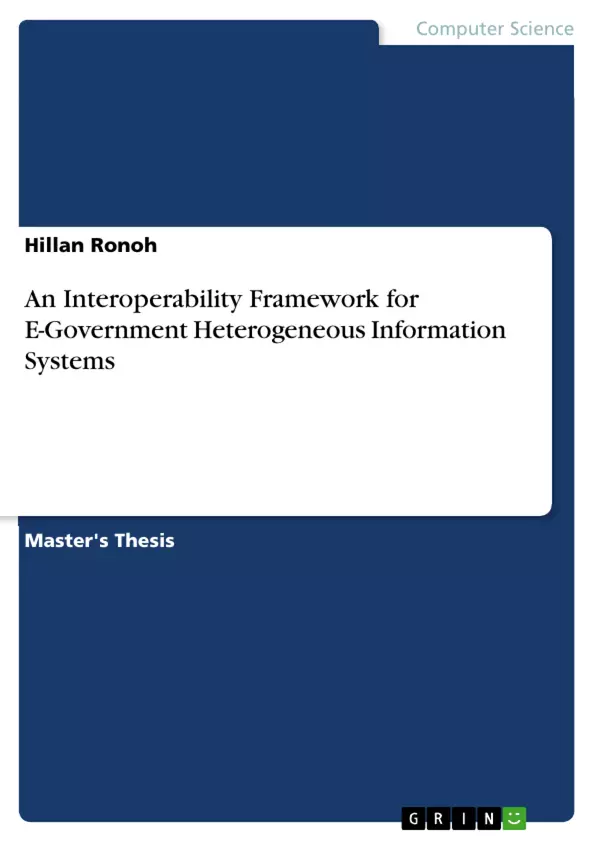The main objective of the study was to develop an interoperability framework that defines and guides the establishment of interoperable e-government information systems within different levels of government.
Information Communication and Technology (ICT) utilization has become a backbone of e-government implementation. Six components of information system (hardware, software, people, data, process and network) are combined to deliver information from government to their citizen as part of public services. However, there is an interoperability challenge on e-government implementation related to information system. These systems due to different vendors and their use of different storage types, data formats, languages and middleware platform have become diverse, hence the challenge of interoperability due to heterogeneity of e-government information systems. The study adopted a mixed methods approach where both quantitative and qualitative data was used. The instruments used for data collection included content analysis, interviews and questionnaires. The study used simple random sampling to distribute the questionnaires and purposive sampling technique for the interview schedules. Quantitative data was analyzed using descriptively statistics including mean, mode and standard deviation. Qualitative data was analyzed using thematic analysis. Pearson’s correlation was used to find out the relationship between two variables while controlling the effects of one or more additional variables. ANOVA was used to determine whether the model was important in predicting the interoperability of e-government heterogeneous information systems in Kenya. Expert opinion survey was used to validate the proposed interoperability framework.
Inhaltsverzeichnis (Table of Contents)
- CHAPTER ONE:INTRODUCTION.
- 1.1 Background of the study
- 1.2 Problem Statement
- 1.3 Objectives of the study.
- 1.3.1 General Objective......
- 1.3.2 Specific Objectives......
- 1.4 Research Questions .....
- 1.5 Significance of the study.
- 1.5.1 Kenyan Government..
- 1.5.2 Technology Experts in the public sector
- 1.6 The Scope of the Study
- 1.7 Assumption...........
- 1.8 Definition of Key Terms.
- 1.8 Limitation of the study.
- 1.9 Thesis Organisation......
- CHAPTER TWO:LITERATURE REVIEW..
- 2.1 Introduction ............
- 2.2 Overview of e-Government Information Systems
- 2.2.1 Heterogeneity in e-government information systems........
- 2.2.2 Interoperability provisions of e-government heterogeneous information systems......
Zielsetzung und Themenschwerpunkte (Objectives and Key Themes)
This thesis investigates the interoperability challenges of e-government information systems in Kenya. The study aims to develop an interoperability framework for e-government information systems, improving efficiency and effectiveness of government services.
- Heterogeneity in e-government information systems and its impact on interoperability.
- Factors influencing e-government information system interoperability, including technical, semantic, and organizational factors.
- Development of an interoperability framework for e-government heterogeneous information systems.
- Impact of the proposed framework on the efficiency and effectiveness of government services.
- Recommendations for policymakers, information systems developers, and other stakeholders to address heterogeneity in e-government information systems.
Zusammenfassung der Kapitel (Chapter Summaries)
Chapter One introduces the background, problem statement, objectives, significance, scope, and limitations of the study. It defines key terms relevant to the research and outlines the thesis organization.
Chapter Two provides a comprehensive literature review on e-government information systems, particularly focusing on heterogeneity and interoperability challenges. It explores existing interoperability provisions within e-government heterogeneous information systems.
Schlüsselwörter (Keywords)
The thesis focuses on key concepts such as e-government, information systems, interoperability, heterogeneity, Kenya, framework development, and public service efficiency.
Frequently Asked Questions
What is the main objective of the e-government study?
The goal is to develop an interoperability framework for heterogeneous information systems in Kenya to improve government service efficiency.
What causes interoperability challenges in Kenya?
Challenges arise from different vendors, diverse storage types, data formats, languages, and middleware platforms used across government levels.
What research methodology was used?
A mixed methods approach was adopted, combining quantitative data (questionnaires) and qualitative data (interviews and content analysis).
Who benefits from this interoperability framework?
Primary beneficiaries include the Kenyan Government, technology experts in the public sector, and citizens receiving public services.
How was the proposed framework validated?
The framework was validated through an expert opinion survey to ensure its practical applicability and effectiveness.
- Quote paper
- Hillan Ronoh (Author), 2018, An Interoperability Framework for E-Government Heterogeneous Information Systems, Munich, GRIN Verlag, https://www.grin.com/document/1319134



